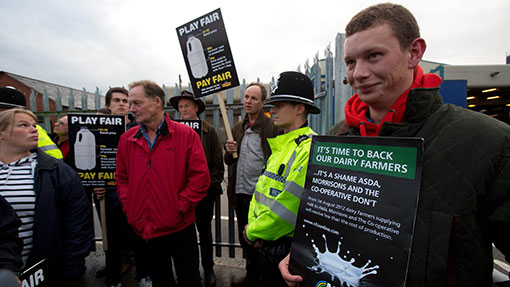Milk protests may resume in October – FFA

Dairy farmers came out in force at a crunch meeting that discussed the possibility of renewed protests against the latest round of milk price cuts.
The dairy crisis meeting, held at Frome Auction Market on Thursday (11 September), was organised by the milk lobby group to seek answers over how best to respond to the ongoing dairy crisis.
During the past month, milk processors have slashed the prices they pay dairy farmers for their milk by as much as 3p/litre, piling on the agony for farmers who were already suffering from months of producing milk below the cost of production.
The FFA is demanding answers from processors and retailers as to why dairy farmers have suffered such a dramatic price drop.
An increase in global supply, falling demand in China and the Russian trade embargo has exacerbated volatility in global and European dairy markets.
But Mr Handley accused the supermarkets and milk processors of using global price crashes as an excuse to lower prices for British dairy farmers. Because the UK uses about 80% of the milk it produces in this country, he believes other factors may be to blame.
Specifically, Mr Handley said the margin retailers were making out of milk was too high – and more of that money should be going to the farmer.
He suggested that if British farmers were to throttle back on milk yields – in turn reducing their feed and input costs – supply across the country would become more scarce, forcing milk buyers into paying a higher price.
“There’s been much talk about milk price cuts being down to issues with Russian trade sanctions, reduced growth in China and so on, but in reality it’s a simple supply-and-demand equation,” he said.
“Right now worldwide milk production is growing by 4-5% and demand is creeping up by just 2-3%. That oversupply can only lead to one thing – suppressed prices.
“To counter that here in the UK we need to tighten supply. Don’t keep chasing volume. It won’t cost us a penny, but it will force processors to pay more for their milk.”
See also: Five charts that explain the milk price crash
Arla Foods director Jonathan Ovens suggested that the Russian situation had very little effect on the UK market.
“Don’t be fobbed off by people telling you that surpluses in the Scandinavian dairy sector due to Russian trade sanctions are the reason for price cuts here,” he said.
“The products they produce don’t match UK consumers’ tastes and so there will be minimal impact on the UK market.”
Meanwhile, Mr Handley encouraged farmers to talk to processors about their requirements as customers.
“We need to view our milk buyers as colleagues and work with them. Ask them how much milk they’ll require next year and build your production profile around that.”
But he added: “I know dairy farmers can talk – there’s no-one better at moaning. That needs to stop and we need to start talking positively to the public and processors.”
At the end of the meeting, dairy farmers were asked to vote over whether milk protests, such as blockading milk processing depots, should resume in five weeks’ time.
About 70% of the estimated 150 people in the room supported some form of action, although Mr Handley later sounded a note of caution.
“Should we protest? Right now isn’t the time. We need to hold off for five weeks and see how the retailers respond. They know what it costs to produce a litre of milk and know we can’t keep losing money.”
He pointed out that Tesco was due make an announcement on its latest milk price at the end of the month and, if it shows a rise, other retailers and processors would likely follow suit.
“I can’t wait for Tesco to come out with their latest price. I guarantee that it will be more than 30p/litre – that will show those others who’ve been cutting prices just what the real cost of production is.”
Further dairy crisis meetings are due to be held at other markets in the coming weeks – one at Market Drayton, Shropshire, next Thursday (18 September) and another in Carmarthen, Wales, on Thursday, 25 September.
